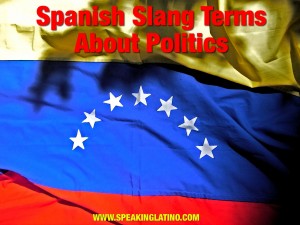An expression used in Mexico to claim dibs or first rights on something. It's the equivalent to saying 'shotgun!' in English. Examples Spanish: Voy a conducir el auto nuevo, ¡zape gato! English: I'm going to drive the new car, shotgun!
¿cómo está la vaina?
A Colombian slang phrase which is used to ask how things are going, similar to 'what's up?' or 'how's it going?' in English. Examples Spanish: Hola Juan, ¿cómo está la vaina? English: Hi Juan, how's it going?
¿qué animal es este gato?
This phrase is not a slang term, but a literal question that translates as 'What animal is this cat?'. It seems nonsensical because a cat is a known animal. It could potentially be used in a humorous or sarcastic context to emphasize the odd or surprising behavior of a cat. Examples Spanish: Mi gato acaba […]
a juro
A Venezuelan slang term that means 'for sure' or 'definitely'. It is used to emphasize the certainty of a statement. Examples Spanish: A juro tengo que estudiar para el examen mañana. English: I definitely have to study for the exam tomorrow.
a los coñazos
This Spanish slang term is often used in Venezuela and it's used to express doing something in a hard or difficult way, often with struggle or difficulty. Examples Spanish: Tuve que aprender a los coñazos a hacerlo. English: I had to learn the hard way to do it.
a pata de mingo
A phrase primarily used in Spain that describes an unstable situation or something that is unbalanced. It can also refer to something or someone that is unreliable or inconsistent. Examples Spanish: Este plan está a pata de mingo, no creo que funcione. English: This plan is like a flamingo's leg, I don't think it will […]
abre cancha
A colloquial phrase used primarily in Venezuela, which literally translates to 'open field'. It is used to tell someone to make way, give space or move out of the way. Examples Spanish: ¡Abre cancha! Necesito pasar con estas cajas. English: Make way! I need to pass with these boxes.
¡ah muesca!
This phrase is not recognized as standard Spanish slang. The term '¡Ah, muesca!' does not appear to have a clear or commonly accepted meaning in Spanish slang. 'Muesca' typically translates to 'notch' in English, but without context, it's difficult to provide a precise slang interpretation. Please, verify the term or provide a context. Examples Spanish: […]
¡de bola!
It's a colloquial Mexican phrase that is used to affirm something emphatically, similar to 'definitely' or 'for sure' in English. Examples Spanish: ¿Vas a venir a la fiesta esta noche? ¡De bola! English: Are you coming to the party tonight? Definitely!
¡échale bolas!
A colloquial expression used in some Latin American countries, meaning 'put more effort into it' or 'give it your all'. Examples Spanish: ¡Vamos! ¡Tienes que ganar esta carrera, ¡échale bolas! English: Come on! You have to win this race, give it your all!
¡el coño de tu madre! or ¡el coño e’ su madre!
An extremely vulgar insult in Spanish, equivalent to 'your mother's c***' in English. It's an offensive phrase that displays high levels of frustration or anger. Examples Spanish: ¡El coño de tu madre! He perdido mis llaves otra vez. English: Your mother's c***! I've lost my keys again.
¡epa! or ¡épale!
'¡Epa!' or '¡Épale!' is a Spanish slang term often used in Latin America. It is an interjection used to express surprise, alarm, or caution. It can also be used as a casual greeting among friends. Examples Spanish: ¡Epa! No me esperaba verte aquí hoy. English: Wow! I didn't expect to see you here today.
¡ni de vaina!
An expression used to strongly deny something, similar to 'not at all' or 'no way' in English. Examples Spanish: ¿Vas a saltar desde ese acantilado? ¡Ni de vaina! English: Are you going to jump off that cliff? No way!
¡no me jodas!
A colloquial expression used to show disbelief, annoyance, or surprise. It can be translated to 'don't mess with me', 'you're kidding me', or 'don't annoy me'. Examples Spanish: ¡No me jodas! ¿En serio has ganado la lotería? English: You're kidding me! Did you really win the lottery?
16 Venezuela Spanish Slang Terms About Politics
This year has been very controversial in Venezuelan politics with the elections after the death of President Hugo Chavez. When all this was happening, I was reviewing the books Quick Guide to Venezuelan Spanish and Quick Guide to More Venezuelan Spanish. Among the words that caught my attention were several colloquialisms related to politics, government […]
